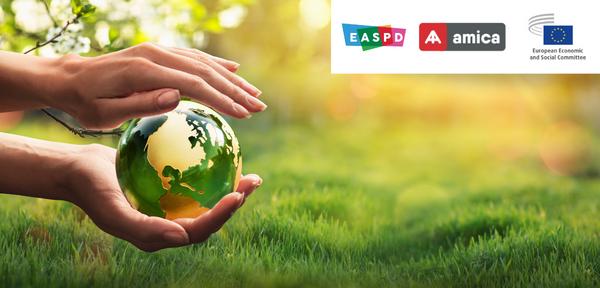Inclusivity and the Green Deal: The future of the Social Economy

The social sector in Europe contributes to 8% of European GDP, employing some 13.6 million people and was formally recognised as a sector by European institutions through the Social Economy Action Plan 2021. The Social Economy is intrinsic in ensuring social inclusion and creating jobs for all. But of its role in transforming our society to greener and more environmentally conscious one?
Amica along with EASPD is organising an event, "Inclusivity and the Green Deal: The future of Social Economy" in Brussels on the 28th of February, 09h00-13h30 CET at the European Committee of the Regions to discuss the Social Economy and the EU Green Deal. Representatives of the European Commission, members of the European Parliament, representatives of from the European Committee of the Regions will be present.
The discussions will centre around how we can transform our economy to make it more environmentally friendly and sustainable alongside ensuring that the process is fair to all Europeans, including the most vulnerable.
This event will be the opportunity to analyse good practices on models of support for the person and business management linked to civil society organisations, through an approach based on the measurement of social impact promoting entities more resilient to change, self-sufficient and generating ecological and social benefits. Ultimately, this space will be dedicated to discussing, demonstrating and questioning the role of the social economy in supporting the green and just transition; and de facto, the EU's Green Deal ambitions
Social sector funding is growing. Private investment is on the rise, supported by the growth of European funds devoted to issues such as inclusion, ethics or ecology. Microcredits, social capital or the funding of start-ups are the most developed private mechanisms. However, figures still can be improved and it is expected that private investment will increase up to 300% in the next 10 years (according to FEBEA).
The regional approach is fundamental in the Social Economy. The Amica model, mainly focused on Cantabria and Valencia, is shown as optimal for the development of the Green Deal.
European institutions are strongly committed to cooperation and the consolidation of social entities as an important actor for the achievement of 2030 goals.

